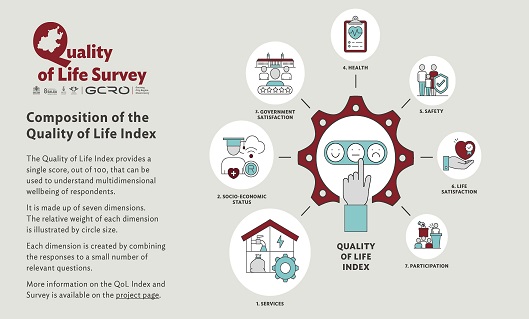Office of the Premier 2021/09/08 - 22:00

Lerato Mailoane
The Quality of Life (QoL) Survey shows that the COVID-19 pandemic has put brakes on anti-poverty and inequality gains made by the Gauteng government.
GCRO QoL 2020/21 results were released on Thursday by Wits University.
The bi-annual research study was conducted by the Gauteng City-Region Observatory (GCRO) from October 2020 to May 2021 and records the lived experiences of 13 616 of Gauteng's residents.
The research started just five months after the county's first hard lockdown in March 2020, data collection spanned the second peak of COVID-19 infections in early 2021 and varying levels of lockdown.
According to the GCRO's Executive Director, Rashid Seedat the research defines the quality of life broadly and looks below the surface of how Gauteng residents live, to understand their experiences, perceptions and challenges.
"We consider living conditions, socio-economic circumstances, self-reported health and well-being, psychosocial attitudes and beliefs, and perceptions of government, service delivery and local challenges."
Addressing the results of the survey, Seedat said there is no doubt that 2020 and 2021 will go down in the history of the world as an extraordinary period.
"The results of the survey reflect the mood of a City-Region confronted by a new, uncertain and challenging social and economic reality brought about by the pandemic."
The QoL 2020/21 findings show an overall Quality of Life Index score of 61 out of 100. This represents a substantial decline from 64 out of 100 in the previous survey, conducted in 2017/2018.
Economic impact
On the economic impact of the pandemic, many respondents reported a reduction in salaries and working hours, as well as job losses.
The report also showed the impact the grants and social support from government such as food parcels have provided some crucial protection to the most vulnerable.
However, in general, the most advantaged have experienced the least economic fallout, while black African respondents and those with lower levels of education have been hit hardest.
Crime levels
On the social fabric, the data shows evidence for substantial, and growing, psycho-social distress. Levels of crime are high, and issues of safety and security are of great concern to residents.
The report details how residents of the province are exposed to high levels of violence in their lives. Over half of adults report experiencing physical or sexual abuse before the age of 18.
One in five men have experienced physical violence over the past year, and five percent of women have experienced intimate partner violence. Self-reported health has worsened, and a higher proportion of respondents are at high risk of depression, showing some decline in mental health.
Service delivery
On service delivery, there is relative stability in the delivery of many basic services, and relatively high satisfaction with government response to COVID-19.
However, many residents feel let down, even abandoned, by government.
Government satisfaction has been deeply, negatively affected.
The survey also highlights an overall decrease in well-being since 2017/18 with the most substantial reductions in the dimensions of governance and socio-economic status.
"While we cannot demonstrate causality, our longitudinal data enable us to assess where shifts in responses have coincided with the arrival of the pandemic, and where they are a continuation of trends pre-dating the pandemic," said Seedat.
Along with the third peak in COVID-19 infections, the violence, looting and arson that engulfed Gauteng and KwaZulu-Natal in early July 2021 took place following the completion of data collection. The impact of these events is not reflected in survey results.
"However, we are conscious that they will have further impacted the experiences, perceptions and beliefs of Gauteng residents," said Seedat.
RELATED NEWS
No related news

